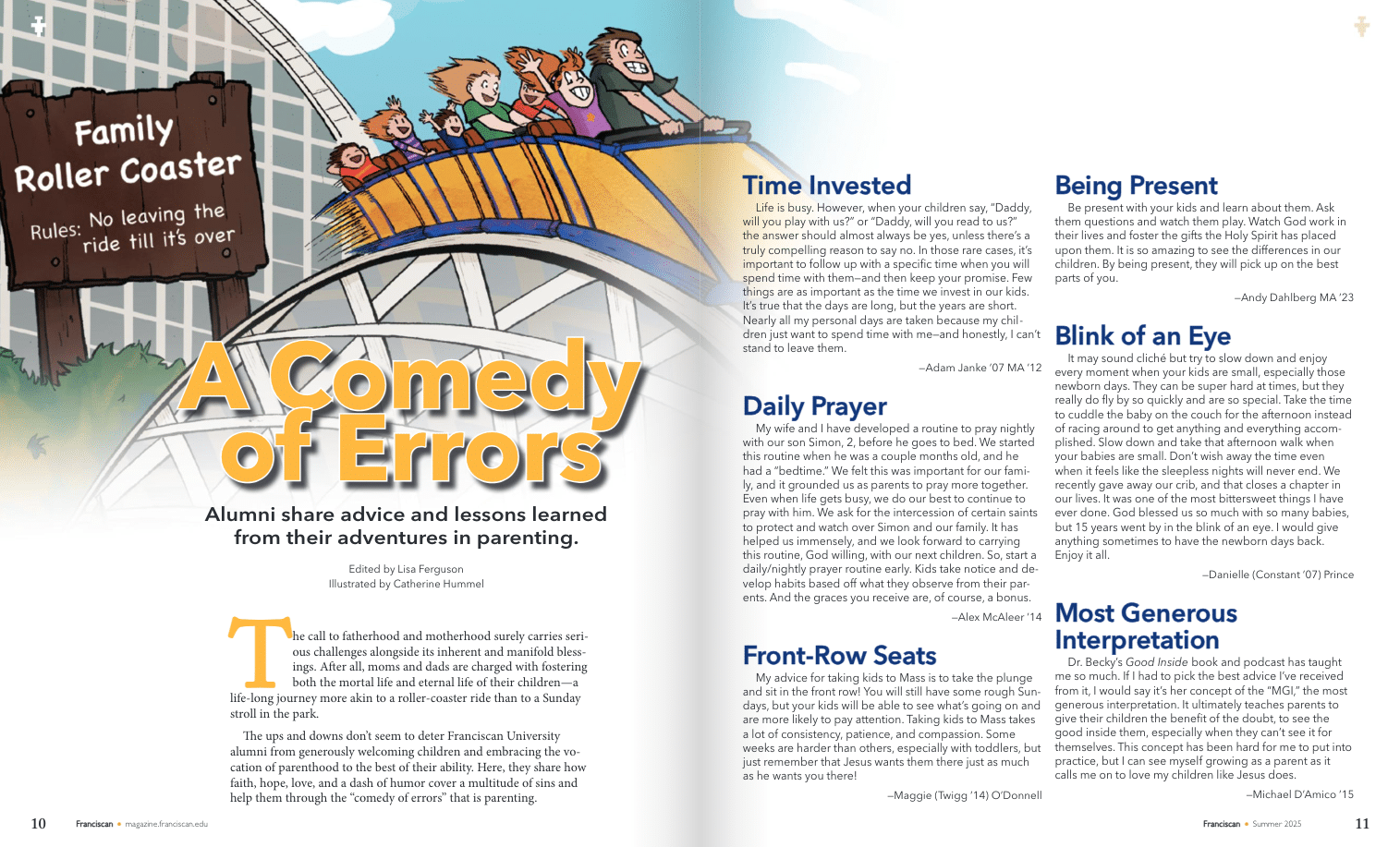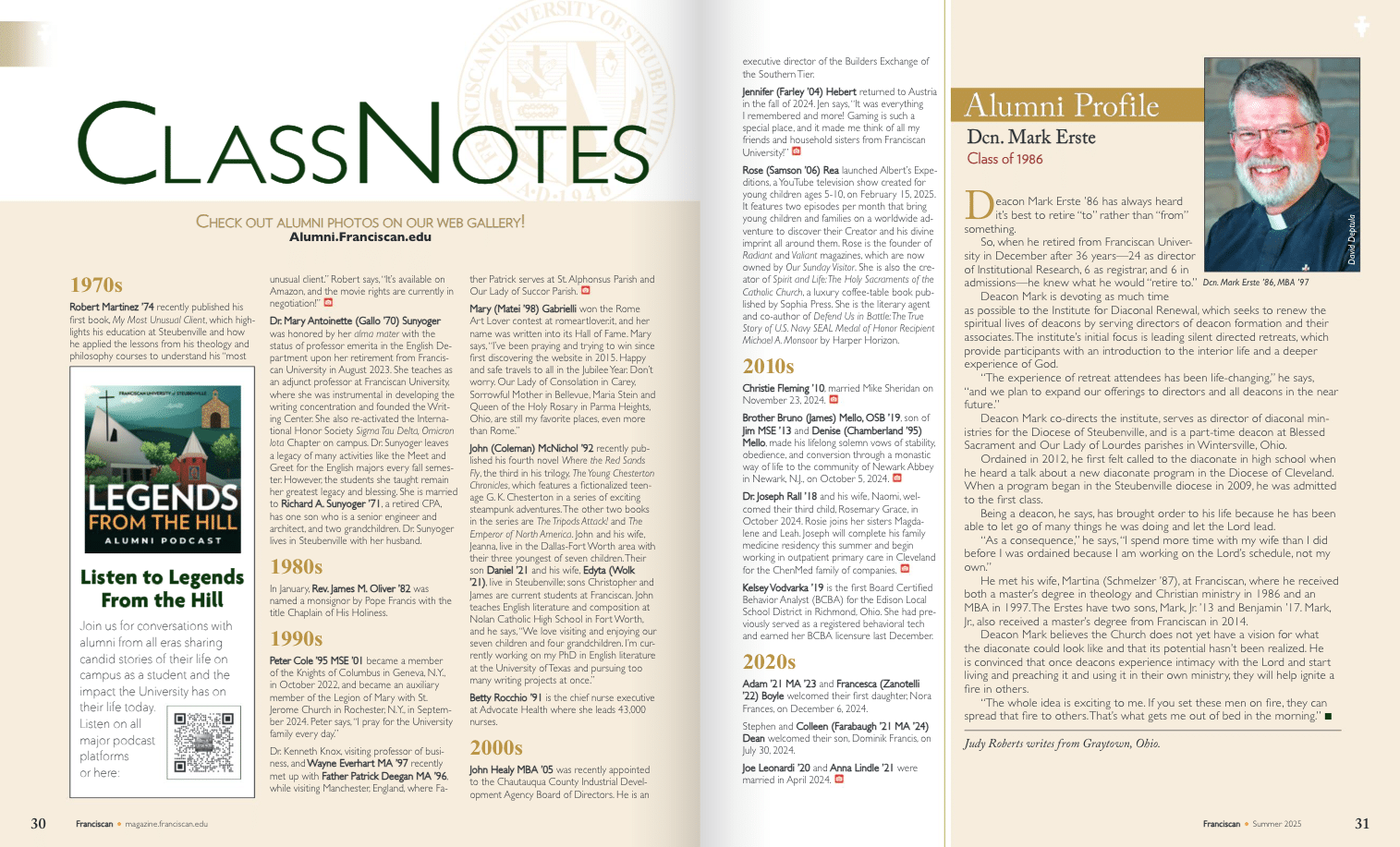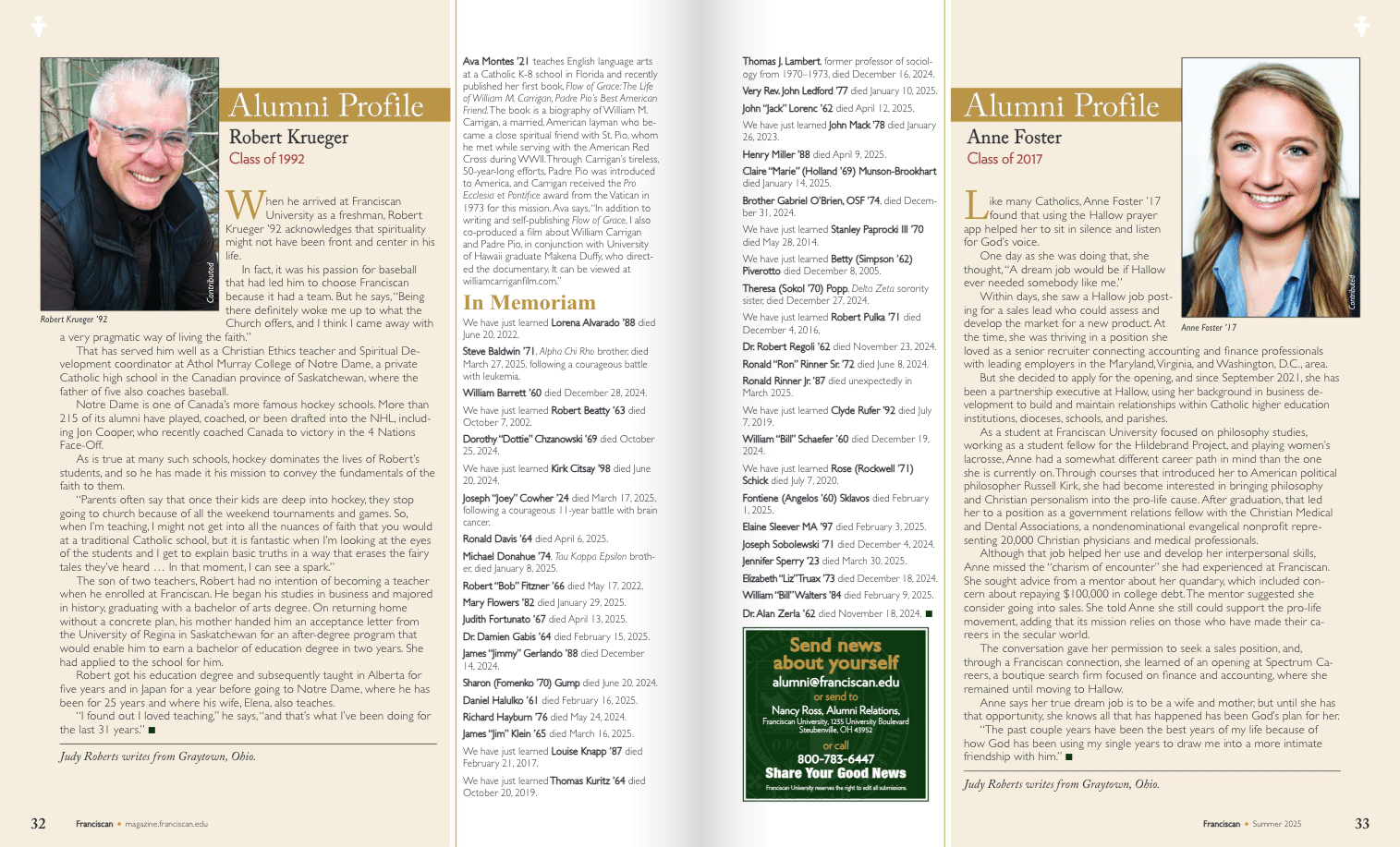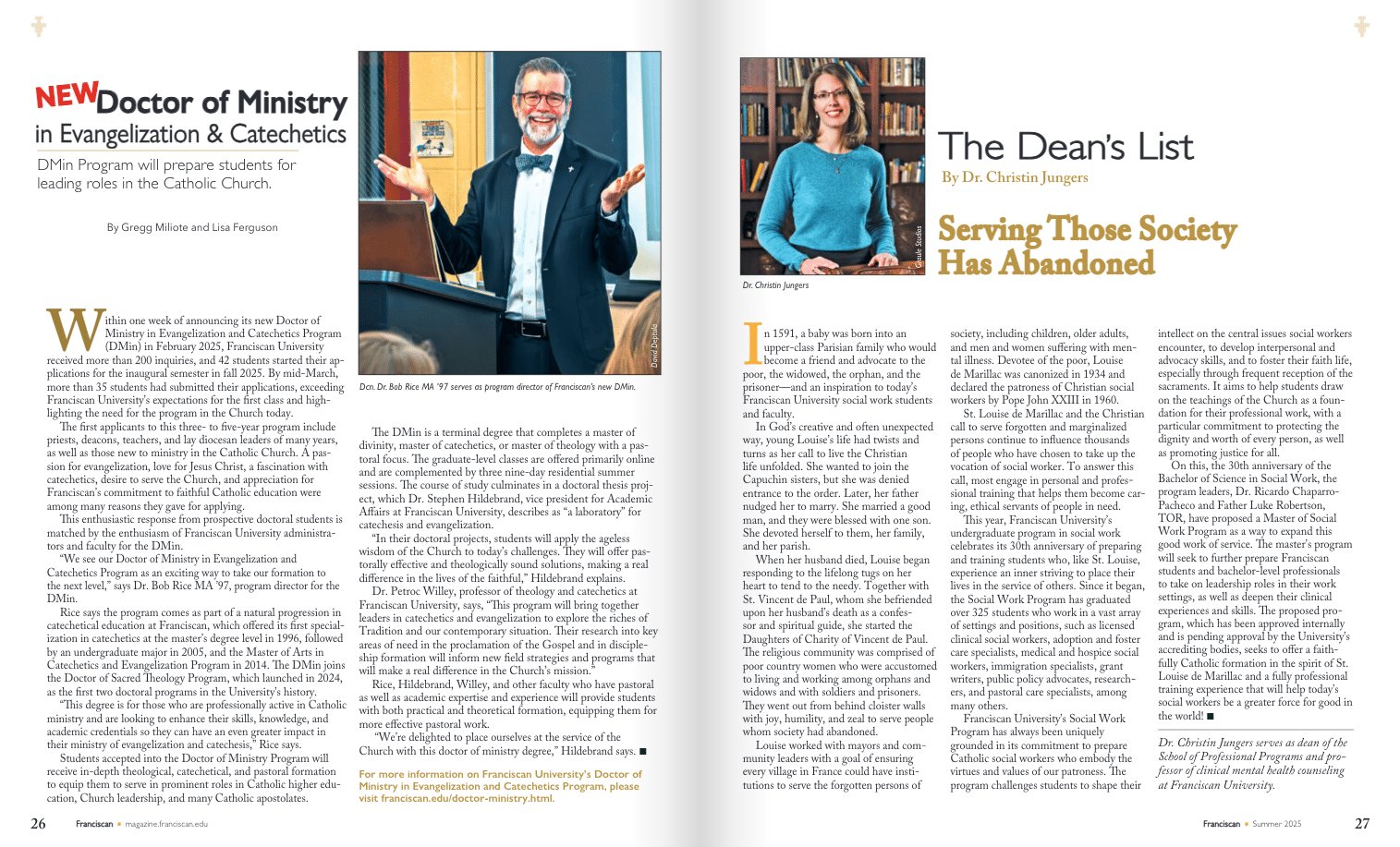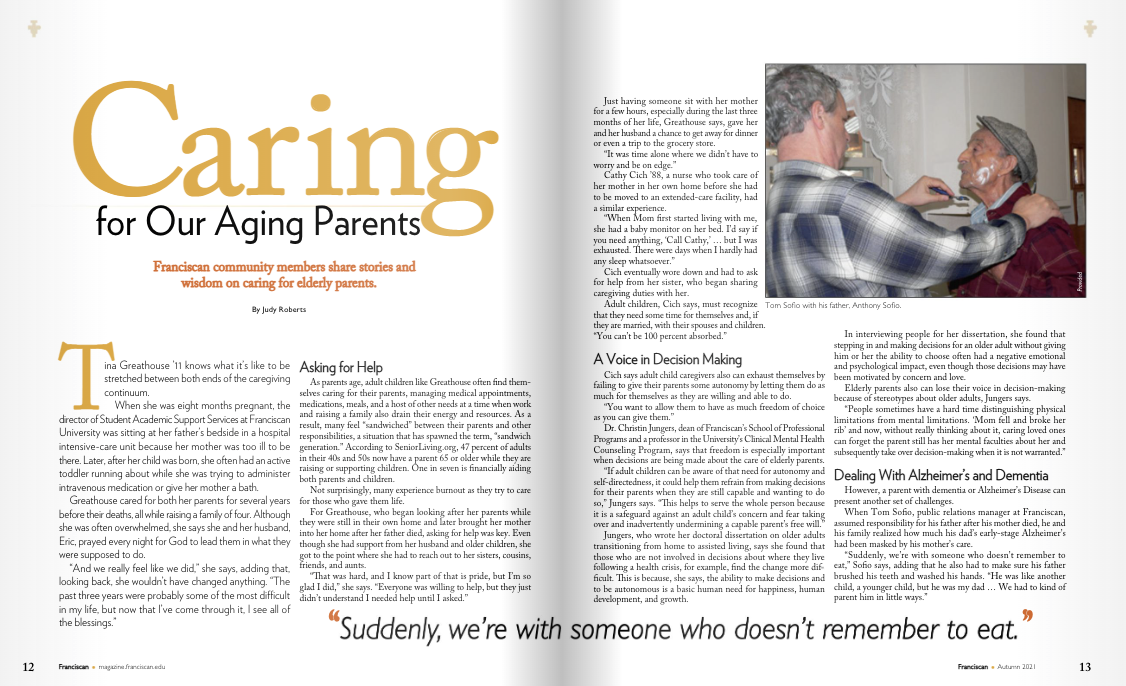The call to fatherhood and motherhood surely carries serious challenges alongside its inherent and manifold blessings. After all, moms and dads are charged with fostering both the mortal life and eternal life of their children—a life-long journey more akin to a roller-coaster ride than to a Sunday stroll in the park.
The ups and downs don’t seem to deter Franciscan University alumni from generously welcoming children and embracing the vocation of parenthood to the best of their ability. Here, they share how faith, hope, love, and a dash of humor cover a multitude of sins and help them through the “comedy of errors” that is parenting.
Time Invested
Life is busy, however when your children say, “Daddy, will you play with us?” or “Daddy, will you read to us?” the answer should almost always be “Yes,” unless there’s a truly compelling reason to say “No.”
In those rare cases, it’s important to follow up with a specific time when you will spend time with them—and then keep your promise. Few things are as important as the time we invest in our kids. It’s true that the days are long, but the years are short.
Nearly all my personal days are taken because my children just want to spend time with me—and honestly, I can’t stand to leave them.
—Adam Janke ’07 MA ’12
Daily Prayer
My wife and I have developed a routine to pray nightly with our son Simon, 2, before he goes to bed. We started this routine when he was a couple months old, and he had a “bedtime.” We felt this was important for our family, and it grounded us as parents to pray more together.
Even when life gets busy, we do our best to continue to pray with him. We ask for the intercession of certain saints to protect and watch over Simon and our family. It has helped us immensely, and we look forward to carrying this routine, God willing, with our next children.
So, start a daily/nightly prayer routine early. Kids take notice and develop habits based off what they observe from their parents. And the graces you receive are, of course, a bonus.
—Alex McAleer ’14
Front-Row Seats

My advice for taking kids to Mass is to take the plunge and sit in the front row! You will still have some rough Sundays, but your kids will be able to see what’s going on and are more likely to pay attention! Taking kids to Mass takes a lot of consistency, patience, and compassion.
Some weeks are harder than others, especially with toddlers, but just remember that Jesus wants them there just as much as he wants you there!
—Maggie (Twigg ’14) O’Donnell
Being Present
Be present with your kids and learn about them. Ask them questions and watch them play. Watch God work in their lives and foster the gifts the Holy Spirit has placed upon them.
It is so amazing to see the differences in our children. By being present, they will pick up on the best parts of you.
—Andy Dahlberg MA ’23
Blink of an Eye
It may sound cliché but try to slow down and enjoy every moment when your kids are small, especially those newborn days. They can be super hard at times, but they really do fly by so quickly and are so special.
Take the time to cuddle the baby on the couch for the afternoon instead of racing around to get anything and everything accomplished. Slow down and take that afternoon walk when your babies are small. Don’t wish away the time even when it feels like the sleepless nights will never end.
We recently gave away our crib, and that closes a chapter in our lives. It was one of the most bittersweet things I have ever done. God blessed us so much with so many babies, but 15 years went by in the blink of an eye.
I would give anything sometimes to have the newborn days back. Enjoy it all.
—Danielle (Constant ’07) Prince
Most Generous Interpretation
Dr. Becky’s Good Inside book and podcast has taught me so much. If I had to pick the best advice I’ve received from it, I would say it’s her concept of the “MGI,” the most generous interpretation. It ultimately teaches parents to give their children the benefit of the doubt, to see the good inside them, especially when they can’t see it for themselves.
This concept has been hard for me to put into practice, but I can see myself growing as a parent as it calls me on to love my children like Jesus does.
—Michael D’Amico ’15
The Family Dinner
My wife, Katie (Scheidel ’98), and I have been blessed with 13 children, with our fourth and fifth grandchildren on the way. A typical Sunday afternoon finds us all together around the brunch table after attending Holy Mass together.
Our family table has been an integral part of our family dynamic, and I believe it has helped us stick together through many different challenges. We decided many years ago, when we were just a small family, that our dinner time was sacred and time for us all to interact and discuss topics of the day.
At one point, we had to choose between children’s sports and the family dinner, and we chose the family dinner. This choice has allowed us to laugh together, critique experimental meals together, and discuss topics ranging from politics to poetry and music to masculinity.
To this day, with three generations, we still value the time together and have tried to invite extended family and parishioners into the Sunday brunch to share our joy.
We have also tried to lead by example, from having quiet prayer time amidst early morning family chaos, to humbly acknowledging when we made a mistake. Katie and I chose to show our love for our God and for each other every day by being faithful to that quiet prayer time as well as showing each other appropriate affection throughout the day.
We even decided that disciplining children at Mass comes second to demonstrating a good example, by remaining quiet and prayerful (even when we have to correct a child’s behavior).
Lastly, we simply try to have fun together. This might be playing in the pool on a hot summer day, dancing and singing in the barn, or cheering on the Philadelphia Eagles. We laugh a lot— sometimes at ourselves and sometimes at each other. This keeps us humble, and we can never take ourselves too seriously.
—Christopher Fifelski ’97
Dialogue Around Death
Be honest about the hard things in life. Kids don’t take it as seriously as we think they will. We have had many losses since having kids and have tried to teach “our goal in life is to get to heaven.” We can only get to heaven through death, but before death, we must die to self. We do this by following the 10 Commandments and God’s teachings.
This teaching has helped the kids understand death as not a final place but a step toward God. Creating dialogue around death allowed for a healthy space for everyone to process and grieve in his or her own way.
—Rebecca (Peters ’14) Brown
“One-Season ” Rule
When I was growing up, my parents encouraged me to try anything that I was interested in. However, there was a house rule that if you signed up for something (piano lessons, a sport, etc.), you had to stick with it for a season. The length of the commitment was discussed beforehand, so I always knew what I was getting myself into.
There were times when an intense interest flickered out or I discovered the reality wasn’t as great as my idea of the activity. Despite my best arguments as to why I should be allowed to quit, my parents stayed strong. A rule I was frustrated with as a child has become a place of deep gratitude as an adult and mother of my own children.
My parents’ “one season rule” not only taught me the value of making a commitment, but also what it means to stay committed when it’s difficult.
—Sarah (Prosser ’15) Wawrzaszek
 Boredom Fosters Creativity
Boredom Fosters Creativity
I’ve noticed many parents today feel the need to keep their kids constantly entertained, enrolling them in every sport and extracurricular activity possible year-round. But I’ve come to realize it’s OK to say no to these activities, turn off the TV, and simply be present with my kids. I’m not perfect at it—and I’ve also learned to let go of the pressure to be perfect—but kids need to understand it’s OK to have downtime with family.
In fact, it’s even OK for them to be bored sometimes. Boredom fosters creativity and problem-solving skills, and I try not to step in with suggestions when my kids say, “I’m bored.” Instead, my response is always, “Hmm, I wonder what you’ll do about it?”
—Erin (O’Byrne ’07) Patterson
Quantity and Quality
As a husband to my wife of 30 years, a father to five daughters, an active lector/Eucharistic Minister/usher/4th degree member of the Knights of Columbus, psychologist, and as an election inspector in my district and Republican Committee member in my county, I’m learning every day how the love and mercy of God can be shared with my family, my church, and my community.
I believe quantity and quality are equally important in terms of raising my daughters to individuate with confidence and a success-mindset in this very challenging world, while simultaneously adjusting my priorities to make myself available to each of my family members when they need and ask.
Therefore, my advice is to be an example to our children of love and service to others but also be ready to nurture their growth and success so Our Heavenly Father can use us all to further build his Kingdom here in our time.
—Dr. Eric Franzone ’89
Teaching the Truth
Our three children are ages 18, 20, 21.
1) Live the faith at home. Live the liturgical calendar. Celebrate as many feasts as possible through the transcendental—truth, goodness, beauty. This for us meant prayers, visuals (movies, artwork/pictures on the wall), and food (cooking with the saints)!
2) Constant conversations. At first, I tried so hard to shelter them from everything we see happening in the world today. However, because we are in the world and not a part of it, I found that speaking about the sin they faced outside of our home and pointing out the lies while at the same time teaching the Truth, was the best approach.
We will not be able to shelter them, we must explain why things are wrong and what the truth is … Who the Truth is. Explain that we have a Father who loves us and desires our hearts and this means we respond to Love by living for him.
3) Offer your children to the Lord. Like St. Rita, (this will be difficult) I constantly pray that the Lord take my children home before they ever fall into mortal sin. The Lord also showed me that I was to place them on the altar of sacrifice, like Abraham did.
That means that every day, I offer them to the Lord as a sacrifice and wait upon the Lord, trusting that He is ultimately the One to care for them, the One to protect them… I need to hand them over to Him on a daily basis as a sacrifice and thus far, He has provided the offering. I don’t know if that makes sense.
4) Consecrate them to Our Blessed Mother and properly impose on them a scapular. We did this when they were very little. We prayed a novena as a family, then our family priest properly imposed the scapular on each one of the kids at our Church, with Jesus in the tabernacle.
Thus far, all three of our kids are following the Lord. Our middle child Lucas is in the seminary. Our oldest child, Andres and youngest child, Emma are active in the Church.
They both currently attend Ave Maria University (I had hoped they went to Franciscan but Miamians just like the heat…and like I like to say, Ave Maria University is the Franciscan of the South… although to me Franciscan is number one).
—Zilkia (Santos MACE ’22) Jimenez
Love, Gratitude, and Consistency
As parents, the number one goal is to make sure your kids know they are loved. I like to add to my “I love you so much!” … “Can you believe God loves you EVEN more?”
Second, don’t beat yourself up at the end of a day you feel went horribly wrong.
Third, BE CONSISTENT, especially in discipline.
Fourth, be mindful of the backstory. We tend to parent in a certain way because of how we were parented. We need to stop, recognize those past situations, and make the right choice, not the emotional one.
Fifth, be thankful every day. Don’t let the years just slip by. Be intentional!
—Amy (Bonsey ’04) Freda
Family Bedtime
We never had strict bedtimes for our kids—instead, we prioritized flexibility and grace in our schedules. Life happens, and we wanted our home to feel natural, not rigid. By keeping evenings open and allowing routines to develop organically, our kids were always included in our time, and some of our best memories came from those spontaneous moments.
Rather than battling bedtime, we all prepared for bed together, prayed as a family, and naturally wound down at the same time. Because of this, sleep was never a struggle—it became a peaceful, shared routine rather than a source of stress.
—Natalie (Williams ’00) Reichert
Mistakes Happen
If you accidentally say a curse word with a child or mentee near you, don’t be discouraged! If they are close enough to hear you make a mistake, they are close enough to hear you say a Hail Mary or any prayer to say you’re sorry.
—Patricia (Morkert MA ’15) Hall
The Blessing of Children and Quick Advice
My children are ages 5, 4, 3, 2, 11 months, and a baby due in August. My first advice is for those who might be like my husband and me. Ultimately, we have decided we really do not have a grave reason for using NFP. Be open to God’s blessing of children!
God allows you to participate in being open to another human person who is made to know, love, and serve God in this world and to be happy with him for all eternity in heaven. There are struggles, suffering, and sacrifices that come with having children, but it is worth it for them to gain eternity with God. Do not be afraid!
God has always provided what our family needed, whether it was financially, mentally, spiritually, etc. Just be sure to keep prayer in your daily life. Also, research quotes by Pope Pius XII about large Catholic families. So great.
Some other quick advice: Children can learn prayers at a surprisingly young age. If you point out Jesus in pictures before they are talking, their first word could even be the Holy Name of Jesus! Many children can memorize very well so keep saying prayers around them and have them pray along as much as they can.
My experience with potty training is it doesn’t always have to do with age—and I have not successfully potty trained an 18 month old, like some might like to encourage. I am starting to believe it basically has to do with genetics and personality. So don’t be discouraged; some learn fast and others learn slow.
Concerning technology: With our children being so young, we basically only do saint videos or some songs once every few weeks. We never show them random TV shows, and they have only seen one full movie and one half of another movie.
No regrets. So totally worth it. I think one result is that their personalities and imaginations are really able to flourish. I also really believe they are more well behaved when they are in a “boring” situation and do not have anything to entertain them with than they would be if they watched TV regularly.
Last is: Mass advice! “Let the children come to me.” Keep going to Mass and try to make it to daily Mass. I can almost hear you say, “What! You think I want to have more whining and crying than I get during Sunday Mass? No thank you!” To become good at anything requires practice, and that includes sitting quietly!
Even more importantly, you are all participating in the most important celebration you can go to! Yes, they will be disruptive at times, but it’s not about them and it’s not about you, it’s about God. Bringing snacks and toys is a shortcut to “good” behavior, and it doesn’t take long for the fighting and crying over toys to begin. Personally, we have realized not to bring toys or snacks since they became more of a distraction/disruption.
—Nicole (Krajewski ’14) Matz
Father and Mother Know Best
Every child is different, and every family is different; therefore, what works for every child and every family is different. Embrace your God-given parental authority, and trust you know what’s best for your child(ren).
Even if a trend or a study or the well-meaning, unsolicited advice from a friend or family member says something different, if it’s not inherently immoral or life-threatening, just do what works for your family.
—Jess (Lemoine ’20) Dabhi
The Golden Strategy for Teaching Emotional Regulation to Children
One of the greatest gifts parents can give their children is the ability to regulate emotions. Many assume this means controlling emotions, but true regulation begins with recognizing and processing feelings before deciding how to respond.
Skipping this step can lead to emotional struggles in adolescence and adulthood. Fortunately, a simple shift in how we validate emotions can foster emotional intelligence and resilience.
Validation: The First Step in Regulation
When a child falls and cries, the instinctive response may be, “You’re okay!” While well-meaning, this dismisses their emotional experience. Instead, validating their feelings with statements like, “That looked scary! Are you okay?” helps them feel seen and understood, teaching them to process rather than suppress emotions.
The Power of Emotional Vocabulary
Children regulate emotions better when they can name them. Asking, “How did that make you feel?” or “What do you need right now?” builds an emotional vocabulary. A child who can say, “I feel frustrated” instead of acting out is already one step closer to self-regulation.
Teaching Emotional Order from a Catholic Perspective
As Catholics, we often deny emotions because we are called to follow truth over feelings. While it’s true that we should not be ruled by emotions, denying them altogether is not the answer. Emotions are part of the human experience—Jesus Himself wept, felt sorrow, and experienced righteous anger. The key is teaching children to acknowledge emotions while discerning their proper place.
We can guide children in distinguishing between feeling an emotion and acting on it. Instead of suppressing anger, we can help them say, “I’m feeling angry, but I can choose to respond with patience.” This instills the understanding that emotions inform but should not dictate actions.
How This Translates to Adolescence
Teenagers experience heightened emotions that are often dismissed as dramatic. If their feelings are invalidated, they may withdraw leading many to struggle with anxiety and depression.
Instead of minimizing their experiences, asking, “What emotions came up for you today?” creates a space for healthy emotional processing. Over time, teens learn to regulate emotions without relying on parents to fix problems.
Parents Must Do the Work Too
Parents who were raised in emotionally dismissive environments may struggle to validate their children’s emotions. Reflecting on personal habits—Do you rush to “fix” emotions? Do you struggle to name your own feelings?—can help parents foster emotional intelligence in their children.
The Long-Term Impact
Consistently validating emotions helps children develop: healthy relationships with others and self; constructive emotional expression; self-trust and intuition; emotional self-regulation.
This simple practice sets children up for lifelong success by teaching them that their emotions—and they themselves—matter.
Final Thought
Children deserve to be heard. By validating emotions early, we equip them with the tools to process feelings in a healthy, ordered way—guiding them to live with both emotional awareness and moral clarity.
—Anna Halsey ’21, ACSW, is an associate clinical social worker in California. She graduated from Franciscan University in 2021 and earned her master of social work in 2024. With experience as both a teacher and therapist, she has spent the last two years helping families and adolescents develop stronger emotional connections.

Facing Mental Illness
Marriage and children: People often say that nothing can really prepare one to be a parent. It’s also true that the relationship between husband and wife is tested when the two become parents.
The couple may have differences in how to discipline or setting expectations with kids. And then there’s unforeseen health challenges that might be faced. As much as our faith provides stability and a place from which to respond to these life experiences, it’s an ongoing, even daily, pursuit to moderate the way in which we manage decisions.
We’ve been married for 25 years now. We have been blessed with five children. Our oldest, a son, was born a few days after we celebrated our first anniversary. Then four daughters followed. Our kids are 24, 23, 20, 18, and 16.
Something we didn’t expect, but have come to understand, is how many families live with a child struggling with mental illness. We feel extremely grateful that despite the mental health challenges we’ve had to navigate with some of our children, they are thriving at the moment. But this is not to say our marriage wasn’t tested.
We have learned that each parent has a different approach to supporting their child with these things. We have also learned we are not alone. It’s incredible how many Catholic families are dealing with this. Unlike physical illnesses and diagnosis, parents can feel embarrassed or even like failures when a child is affected in this way.
We are grateful our kids who live with a particular mental health diagnosis have faith and continue to pursue their Catholic identity. We also know many parents have had to simply put their child in God’s hands and pray for healing.
We have learned it’s important to overcome fear and look to others for support. Sometimes just talking with another family that may have similar challenges can provide consolation and hope. The important thing is knowing we are not alone.
—Heather (Prush ’96) Perry

Laugh Often
Don’t take parenting advice too seriously! Everyone is different, everyone’s kids are different, and God works in many varied ways in our lives. What works great for one person won’t necessarily work well for you. Experience is the best teacher.
I think G.K. Chesterton said if something is important enough, it is worth doing poorly. Don’t be afraid to make mistakes and learn from them. All good parents are bad parents, too! Every day is a new opportunity to do it better.
Go to confession often (you will need it!), say sorry to your kids if you have a bad day, and learn to forgive yourself. And don’t forget to laugh often! Parenting is really just a comedy of errors in the end.
—June (Schauster ’07) Pescosolido
2+2 ≠ 4 in Parenting

Over the last six and a half years, I’ve served as a mental health therapist for a faith-based agency in Pittsburgh where I’m sure I’ve learned more from my clients than they’ve received from me.
The same can be said for my adult children, especially our youngest son whose disabilities and Down Syndrome continue to inspire me daily. Talk about an Influencer!
Beware of the Overcompensation Trap. You think your partner is too strict with the children, so you tend to be more lenient, especially when he’s not around.
You feel your spouse is too indulgent, so you become more demanding to avoid spoiling the children. What happens? Your efforts to compensate for your partner’s style continue to widen the gap until it blows up in battle for which one of you is right.
You can’t schedule quality time. Oh, I know you can schedule date night with your wife, family night, or personal time with each one of your kids. But just because it’s in your calendar doesn’t mean it’s going to be a special moment.
Those come randomly and unexpectedly when you’re in the right place at the right time: when a son wants to “come clean” about the pornography he’s been watching, or a daughter needs to talk about all the anger and hurt she feels toward a girl in school that she thought was her friend.
Remember how you spell love: T-I-M-E.
Artificial Intelligence versus A Grandparent (AI vs. AG). Who’s smarter than a third grader? Suppose there were four recognized stages of raising a child. Additionally suppose that a specific parenting model had a high correlation with the best outcomes in yielding responsible independent adults in multiple research studies.
Suppose further that the model looked like this. Stage One: birth to age 3 – emphasis on bonding between mother and child to establish a secure attachment and the sense that the world is a safe place; requires extensive presence in the home with the child.
Stage Two: age 3 to 10 – need for firm, loving, and consistent boundaries and limits that provide the security that comes from knowing right from wrong; requires united front from parents to implement things like mealtimes, bedtimes, use of media, and consequences for unacceptable behaviors.
Stage Three: age 10 to 13 – focus on learning problem-solving skills and anticipating the outcomes of choices; requires parents’ presence before, during, and after the events to coach alongside.
Stage Four: age 13 to 18 – need for increasing autonomy that is permitted to experience the consequences of choices: friends, use of time, interests, schoolwork, etc.; requires a “relaxed grasp” approach to parenting that resists the urge to bail them out rather than face the music.
Now you make the call. AI or AG? (Hint: The alternative model emphasizes children making their own decisions and choices until around age 12 after which the parents make the decisions for their children about their choice of friends, acceptable dress, college selection, church attendance, and career direction.)
Two and two doesn’t equal four in parenting. Just because you think you did all the right things in raising your family doesn’t mean all your children will turn out the way you had hoped. They have free will. They grew up in their unique birth order, with their unique personality and wiring, with their unique experiences outside the home, and their unique perception of your love for them (or not).
When we ask God why our adult children may have rejected the faith in which they were formed in their youth despite all our efforts and sacrifice, his response may be something like: “Welcome to my world.”
—Thomas Kneier ’73 MA ’93





